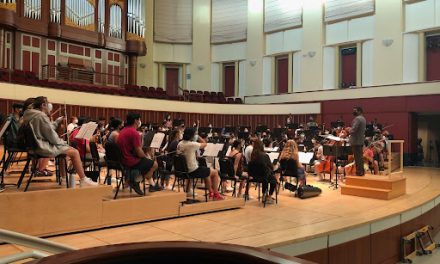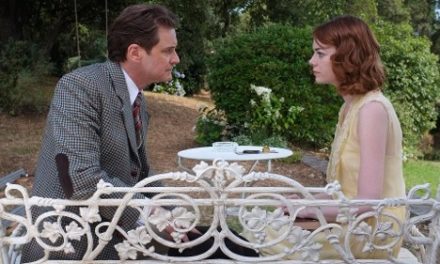The moment I opened the doors to Harland Cinema, it became clear that people weren’t bursting with excitement about this year’s Homecoming comedy show. The theater hummed softly on Wednesday evening, barely full as attendees awaited comedian Chris Distefano.
The star of MTV’s Guy Code, a show geared around celebrities discussing the special code that exists between men, Distefano headlined this year’s comedy show. With his high energy and natural storytelling ability, Distefano delivered an engaging and racy performance. He successfully captured the audience’s attention, as he discussed everything from growing up in Brooklyn, N.Y., to Zika virus.
Doors opened at 7 p.m. During the 55-minute wait for Distefano, the crowd grew exponentially, both in number and impatience. Amid the anticipation, attendees received the opening act, Yedoye Travis, an Emory alumnus from Stone Mountain, Ga., with hesitant laughter.
Travis tried to warm up the crowd, reminiscing about his time as an undergraduate student. Describing himself as the “hipster Frederick Douglas,” he headed straight for sensitive subjects, such as racial profiling and police violence. At one point, he declared, “I came to make you uncomfortable.” After some back-and-forth banter with various audience members and a few laughs from the crowd, he announced, “Okay, I’ll stop talking about race now … Do you guys drink?”
Despite Travis’ blatant attempts to impress, the audience seemed ready for the next act. Travis’ ribaldry was cringe-worthy, but the discomfort continued throughout the night.
Distefano barreled through the doorway in a red Atlanta Braves jersey, immediately thanking Emory for all the meatball sandwiches provided before the show, him being Italian. He admitted that he initially thought the baseball jersey would help him fit in, but then joked to the tough crowd that most of Emory’s population is “from the North and Korea.” This received laughter from some, but not from the student he picked out in the front row, whom Distefano assumed to be Korean even though he was not.
After introducing himself, Distefano discussed the addition to his family and fatherhood.
“My new daughter: half Puerto Rican, half Italian. I named her West Side Story,” Distefano said.
It was a cheesy remark, but fit for the audience, who roared with laughter. He later joked about his girlfriend, telling the crowd that “One time another Puerto Rican woman liked my tweet. My girlfriend followed her … home.” His deadpan expression once again triggered laughter from the audience.
During a story of his trip to England, Distefano joked about the cultural difference: “Everything’s backwards over there. I was asked my surname and I said, ‘Sir Chris Distefano?’ ” which had the audience cracking up.
When a group of students made their way to the exit early, Distefano teased each on their way out. In a British accent, he cried, “Not if he’s going to talk about England,” emitting a quiet set of chuckles as they slipped out the door. This seemed like a desperate attempt to maintain the shrinking audience.
While his bizarre anecdotes outnumbered his classic one-liners, the comedian’s charisma and connection with the audience were the strongest assets to his performance. Distefano nicknamed audience members “toes” (in awe of men not wearing socks in the South), “one-word” (for his refusal to be mocked) and “Bieber hair,” referring to them throughout the performance. This connection gave Distefano’s performance the refreshing feeling of improvisation.
Near the end, Distefano opened the floor to questions. When asked, “Which former U.S. president would you take to a deserted island, and why?” he replied, “Bill. At least he knows where the girls are at.” Again, DiStefano’s ability to respond rapidly with wit to these unscripted questions highlighted his comedic talent and caused the audience to laugh genuinely.
However, those commendable moments were negated by Distefano’s excessive rudeness. Distefano’s open approach using clean and off-color comedy was unexpected, due to his usually innocent performances with CollegeHumor. While even veteran comedians, such as Jerry Seinfeld and Chris Rock, have discussed avoiding college campus gigs because they’re too politically correct, Distefano was fearless of the college students in the crowd. Using a stereotypical Indian accent for a punchline and calling a Jewish student in the audience “a walking bagel,” Distefano’s controversial remarks received skeptical laughs and disapproving looks.
After managing to offend almost every ethnic group in attendance, Distefano acknowledged and poked fun at the audience, ending his performance by saying, “They say you college students are all so sensitive. You can’t even spell sensitive.”






